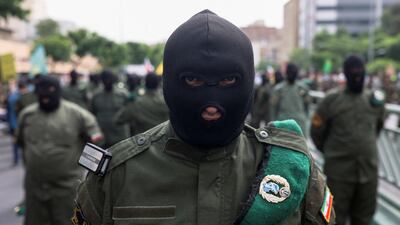A member of Iran's Islamic Revolution Guards Corps was shot dead when gunmen fired four bullets at him on Tuesday night, Iranian state media said.
Qassem Fathollahi was also a commander of the paramilitary Basij forces operating within the IRGC.
State media called the incident a "terror attack," although Colonel Ali Sabahi of the Tehran police's information centre said signs of a "robbery" surrounded the incident.
Iran has been witnessing nationwide protests for more than three months, since 22-year-old Kurdish-Iranian Mahsa Amini died in police custody after her arrest by the so-called morality police for being in violation of the country's dress-code.
Last month, another IRGC member was shot in Isfahan by what the regime called "armed counter-revolutionary villains".
Despite the slight uptick in violence, one analyst believes it is too soon to say that the status quo has changed.
"If people feel like their peaceful protests have failed to achieve their demands and their ambitions or bring about real change, they could attempt to express their anger using alternative means and this is valid," Mohammad Al Zghool, Iranian affairs researcher at Abu Dhabi-based think tank the Emirates Policy Centre, told The National.
"But it is too early to say that the protests are turning into a form of resistance because reaching this point has pre-conditions."
Mr Zghool says the presence of a clear opposition leadership that has a strategy to topple the government is still lacking.
"These are still organic demonstrations that take the form of public outcry, and anger on the streets," he said.
Reaching a new wave of protests, which have now become relatively weak, as opposed to when they first began in September 2022, would require a "new spark", Mr Zghool said.
Iran is also marking the third anniversary since the killing of IRGC general Qassem Soleimani in a US drone strike in 2020.
Pro-government events were held across Iran to mark the occasion as President Ebrahim Raisi vowed to hold those behind the attack responsible.


